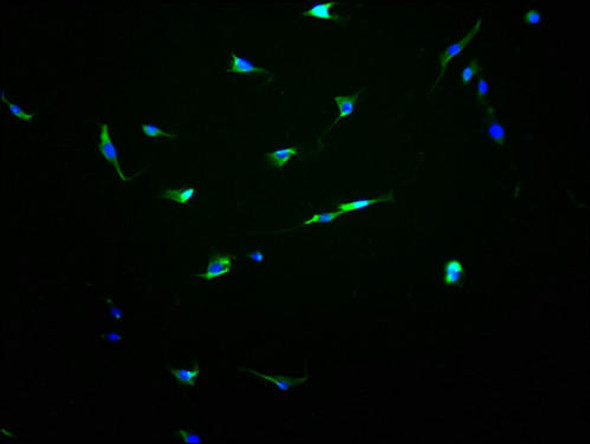Description
| Antibody Name: | TMEM237 Antibody (PACO05072) |
| Antibody SKU: | PACO05072 |
| Size: | 50ug |
| Host Species: | Rabbit |
| Tested Applications: | ELISA, WB |
| Recommended Dilutions: | ELISA:1:20000, WB:1:500-1:2000 |
| Species Reactivity: | Human, Mouse |
| Immunogen: | Synthesized peptide derived from the Internal region of human ALS2CR4. |
| Form: | Liquid |
| Storage Buffer: | Liquid in PBS containing 50% glycerol, 0.5% BSA and 0.02% sodium azide. |
| Purification Method: | The antibody was affinity-purified from rabbit antiserum by affinity-chromatography using epitope-specific immunogen. |
| Clonality: | Polyclonal |
| Isotype: | IgG |
| Conjugate: | Non-conjugated |
| Synonyms: | TMEM237; ALS2CR4; Transmembrane protein 237; Amyotrophic lateral sclerosis 2 chromosomal region candidate gene 4 protein |
| UniProt Protein Function: | ALS2CR4: Component of the transition zone in primary cilia. Required for ciliogenesis. Defects in TMEM237 are the cause of Joubert syndrome type 14 (JBTS14). An autosomal recessive disorder characterized by severe mental retardation, hypotonia, breathing abnormalities in infancy, and dysmorphic facial features. Neuroradiologically, it is characterized by cerebellar vermian hypoplasia/aplasia, thickened and reoriented superior cerebellar peduncles, and an abnormally large interpeduncular fossa, giving the appearance of a molar tooth on transaxial slices (molar tooth sign). Additional variable JBTS14 features include renal disease, abnormal eye movements, and postaxial polydactyly. Belongs to the TMEM237 family. 5 isoforms of the human protein are produced by alternative splicing.Protein type: Membrane protein, integral; Membrane protein, multi-passChromosomal Location of Human Ortholog: 2q33.2Cellular Component: membrane; integral to membraneBiological Process: regulation of Wnt receptor signaling pathway; cilium biogenesisDisease: Joubert Syndrome 1; Joubert Syndrome 14 |
| UniProt Protein Details: | |
| NCBI Summary: | The protein encoded by this gene is a tetraspanin protein that is thought to be involved in WNT signaling. Defects in this gene are a cause of Joubert syndrome-14. Two transcript variants encoding different isoforms have been found for this gene. [provided by RefSeq, Jan 2012] |
| UniProt Code: | Q96Q45 |
| NCBI GenInfo Identifier: | 113205075 |
| NCBI Gene ID: | 65062 |
| NCBI Accession: | NP_001037850.1 |
| UniProt Secondary Accession: | Q96Q45,Q53TS9, Q53TT2, Q7Z3B6, Q8IZ18, Q8NBF8, B4E1R8 B4E2R8, E9PAR8, E9PBF8 |
| UniProt Related Accession: | Q96Q45 |
| Molecular Weight: | 45,526 Da |
| NCBI Full Name: | transmembrane protein 237 isoform a |
| NCBI Synonym Full Names: | transmembrane protein 237 |
| NCBI Official Symbol: | TMEM237 |
| NCBI Official Synonym Symbols: | JBTS14; ALS2CR4 |
| NCBI Protein Information: | transmembrane protein 237; amyotrophic lateral sclerosis 2 (juvenile) chromosome region, candidate 4; amyotrophic lateral sclerosis 2 chromosomal region candidate gene 4 protein |
| UniProt Protein Name: | Transmembrane protein 237 |
| UniProt Synonym Protein Names: | Amyotrophic lateral sclerosis 2 chromosomal region candidate gene 4 protein |
| Protein Family: | Transmembrane protein |
| UniProt Gene Name: | TMEM237 |
| UniProt Entry Name: | TM237_HUMAN |






